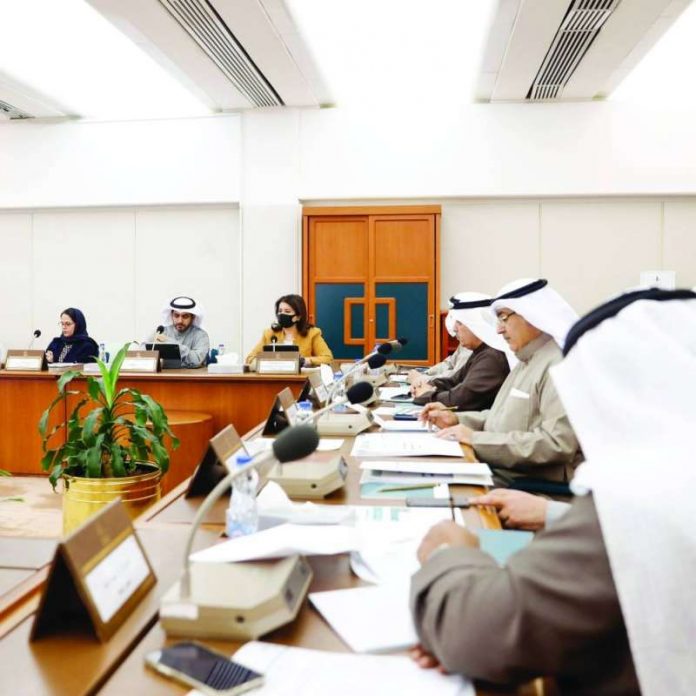The agenda of the regular session of the National Assembly scheduled for tomorrow, Tuesday is preceded by the Parliamentary Finance Report on “Islamic” government sukuks, as the committee submitted it after voting on it with approval, including the opinion of government agencies and relevant authorities, most notably the Central Bank of Kuwait, which confirmed Governor Dr. Muhammad Al-Hashel said, “We are far behind in enacting a law on Islamic Sukuk, and we are in dire need at this stage to speed up the adoption of this law.”
Al-Hashel said during the committee meetings said, as stated in the report, “we have previously made claims since the nineties of the last century for the existence of such legislation. The presented draft law was drafted after extensive study and research, in which we reviewed the best international practices in this regard, and visited the Kingdom of Bahrain for its long experience in this field. This law comes to complete the legislative structure of the Islamic banking system, which began with the establishment of the Kuwait Finance House in 1977, as the State of Kuwait was a pioneer in this field in the region,” Al-Rai daily quoted the minister as saying.
He added, “After the success of this experiment and the increase in demand for Islamic banking services, other seven Islamic banks were established (6 local and one foreign). However, despite Kuwait’s leadership in Islamic banking, and the growth of this sector until it now represents 40 percent of the banking sector, we still have a legislative shortcoming in this field. We are with the existence of a law regulating government Sukuk, which is an important tool of monetary policy that provides options and alternatives compatible with the provisions of Islamic Sharia that will develop and develop this important and vital sector.”
The committee included in its report the opinion of the Ministry of Finance, whose representatives confirmed that “the Sukuk market is complementary and very important, and its size is increasing day by day and that the existence of this law gives an additional tool for managing public debt issuances. It also allows investors to choose the appropriate financing tool for them, as there are investors who do not participate in sovereign issues, due to their non-compliance with the provisions of Islamic Sharia.”
The report also included the opinion of the Finance Committee, which stated, “After the committee studied the draft law, and listened to all opinions, it became clear to it the necessity of approving this law in light of the current economic conditions and the persistent deficit in the general budget in the past five years, due to fluctuations in oil prices, which affected Turn on the levels of liquidity in the banking sector.
The committee decided to form a working group consisting of the committee’s technical office, the Central Bank, and the Capital Markets Authority, to take the members’ observations and all other opinions and observations. For this purpose, the team held four continuous meetings, in which it prepared a consensual draft law, which was studied by the committee and ended with the drafting of the law. One of the committee members had reservations about Article (7) because it stated that the company’s capital was not commensurate with the assets of the Sukuk.
The representatives of the Capital Markets Authority explained, as stated in the committee’s report, “the market is not ready to list and trade government Sukuk, and the market is not ready for that, and we are currently working on implementing a plan for listing and trading Sukuk within the fourth phase of the market system development plan.”
The Kuwait Chamber of Commerce and Industry indicated, in its memorandum submitted to the committee, that “the organization and structure of Islamic Sukuk have not yet been completed, despite the Kuwaiti legislator’s interest in this Sukuk; The Companies Law No. (1) of 2016 included regulation of special Sukuk issued by companies. This draft law is comprehensive and integrated for sukuks and includes their legal and regulatory provisions, in response to the state’s need for financing tools that comply with Islamic law, contribute to the financing of development projects on the one hand, and wealth financial policy tools on the other hand, and allow those who prefer to invest in accordance with Islamic Sharia an opportunity to invest in high security on the third hand.
The Chamber stressed “the importance of issuing the law regulating government bonds as soon as possible, especially in the current circumstances noting that most of the countries of the Gulf Cooperation Council and others preceded the State of Kuwait in issuing similar laws.

















